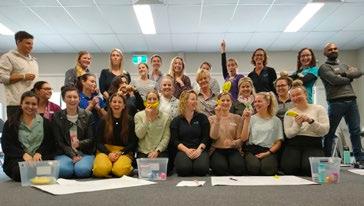
13 minute read
How You Celebrated OT Week 2020
Last year we reflected on and highlighted how occupational therapists work to support all people to engage in activities they find meaningful. Through the hashtag #ThisIsOT, people shared stories from their occupational therapy journey, learnings to offer, team photos, information on their practice area, and why they love OT.
In 2020, given the onset of droughts, bushfires, and the global pandemic, our OT Week theme was: Resilience: Supporting our communities to rebuild, recover, and reengage. In supporting people to participate in activities they find meaningful, occupational therapists are vital in helping our communities through disaster recovery.
This year the event not only shined a spotlight on the value of occupational therapy in our communities, but also served as a call to arms to support those hardest hit.
OT Week event in West Moreton, Ipswich, Queensland

The Early Links OT team having fun at their OT Week event

OT staff at Osborne Park Hospital, Perth. Anne Pressley led a presentation on ‘OT in a COVID-19 World’, followed by an accessible gingerbread house building competition Pam Samra and Hannah Terry on the sunny Gold Coast, representing Mental Health OT
Celebrations Across Australia
In the midst of a challenging year, it was pleasing to still see such a diverse range of events (both in-person and online) held by our OT community across Australia. Here’s a look at how you and your peers celebrated the value of occupational therapy during OT Week 2020.

bendigoadvertiser.com.au
Life WORLD changing OCCUPATIONAL THERAPY DAYADVERTISING FEATURE Saturday October 24, 2020 BENDIGO ADVERTISER 49
help from OT
WHEN Belinda Abel startedlosing her vision as a result of Autosomal Dominant OpticAtrophy, she was 1300 kmsfrom family support, livingin Orange with her husbandand two children, aged tenand six. "Autosomal DominantOptic Atrophy (ADOA) iswhere the optic nerve dies,"Belinda said. "I thought I just needed stronger glasses but whenthe optometrist scanned theback of my eyes, it showed abigger problem. I couldn't see well enoughto drive at night or readwith my children. Eventually, I had to tell my son'steacher I couldn't help outwith reading in the classroom anymore. I didn't know what washappening, I wasn't copingwell and had lost all self-confidence." AmovetoBendigobrought a clear diagnosis of ADOA for Belinda. At the Eye and Ear Hospital in Melbourne she was given information aboutVision Australia's specialist support in Bendigo, including occupational therapy."That's when my lifechanged. I knew the condition was untreatable, glasses couldn't fix it so I didn't think I could be helped, but withVision Australia, everythingfell into place," Belinda said. "I could control the temperature of the oven, use talking scales, a liquid level sensor to pour hot liquidsand had clear ideas for organising the pantry." Belinda then got involvedin the community, includingwith Vision Australia as a volunteer, supporting otherswith vision loss and her kids are asking her for help again. BETTER LIFE: With better lighting, colour contrast andspecial magnifiers, Belinda no longer got headaches andher kids started asking her for help. Photo: Supplied. Occupational therapy more vital OCCUPATIONAL therapyenables people to participate in activities they find meaningful. These activitiesinclude taking care of oneself(and others), working, volunteering, and participatingin hobbies, interests and social events. When life chang-es suddenly due to accident or illness, it is often the skillsof an occupational therapistthat brings some normalityback to our lives. Lynne Cooper, occupa-tional therapist at BendigoRegional Occupational Therapy said it was appropriate that we should acknowledgethe importance of the profession given the devastation ofbushfires and COVID-19. "It is also relevant for any-one who has to face a majorchallenge in their lives," MsCooper said. From acute illness tochronic disability or a traumatic event forces us to con-sider how we can manageinto the future. "Daily occupations we may have taken for granted could become difficult. An occupational therapist willhelp the person to recover, rebuild and re-engage. And once again life can be a positive journey. "Since my graduation,I have seen enormouschanges in the profession.Occupational therapy hasexpanded to become a vital component in the field ofhealth sciences. The BendigoRegional Occupational Therapy award, given throughLatrobe University Bendigocampus, gives me a way of contributing back to myprofession and encouragingsome of our future leaders." EVERY WALK OF LIFE: When crisis hits we are reminded how important the skills ofoccupational therapists are to our wellbeing. Photo: Shutterstock.
Pivotal Occupational Therapy providesoccupational therapy services to olderadults and people living with a disabilityresiding in the Loddon Mallee Region ofVictoria. Pivotal Occupational Therapy is a registeredprovider of services for NDIS, TAC & DVA.Services are also provided to home carepackage providers and their clients.
“The greatest feeling in their independence and the world is being a contribution toengagement in everyday tasks that others and are pivotal enabling to them”
Contact: Lisa Davenport, Occupational TherapistPO Box 310, Bendigo 3552 | P: 0475 333 605E: pivotalot@gmail.com | W: www.pivotal-ot.com.au
VR4640954
Bendigo RegionalOccupational TherapyPrivate Practice
Lynne Cooper
• • Home assessments for fallsSpecial equipment at homeindependence prevention to assist • Wheelchair and scooter assessments• Seating and special chairs • Personal alarm applications• Pressure care assessments • Palliative care - support to stay at home• Carer Support • Advisory service by phone
Ph 5442 4928 M 0438 591 063 E coopero@iinet.net.au
Teal Annett McClellan - Winner of Bendigo OccupationalTherapy Award for a Latrobe UniversityOT student in 2020
VR4640923 Debra, Vision Australia client
Make daily living easier
Access the you love support you need to do the things
• • • Advice on living safely and independentlyAdaptive equipment and assistive technologyMaximise your NDIS and My Aged Care funding Speak with a local Occupational Therapistwho can provide the support you need. Call: 5445 5700 Email: Visit us at: Website: bendigo@visionaustralia.org 20 Bridge St, Bendigo www.visionaustralia.org
OT Week feature in the Bendigo Advertiser, prepared by Lynne Cooper
Monash University OT Department marked World OT Day with over 90 staff, fieldwork partners, collaborators and friends

Baked Goods at OT Week Inter Hospital Department Fremantle Hospital Bake Off (Freemantle)
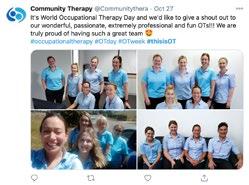
OT Week social BBQ and lawn games event in Whyalla, South Australia

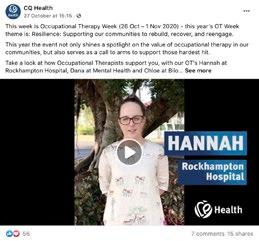
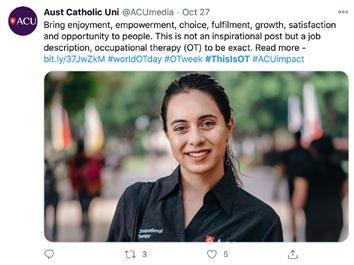
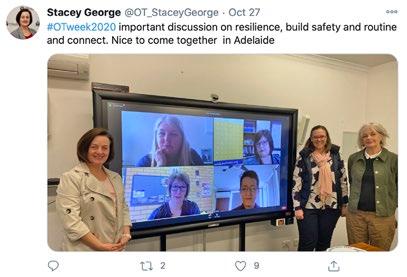

Laura Fletcher and Miriam Hobson celebrating OT Week with the Northern Adelaide Local Health Network team at Lyell McEwin Hospita

OT Week Inter Hospital Department Hospital Bake Off (Fiona Stanley Hospital) with team winner Mel Grant
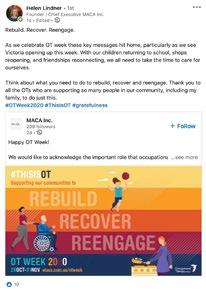
Online Panel and Discussion Event
On 27 October (World OT Day) OTA hosted an interactive online event, featuring a selection of thought leaders (Professor Lisa Gibbs, Dr Leanne Beagley and Dr Samantha Ashby) to discuss and promote resilience in our communities.
The panel was then followed by breakout discussion sessions where attendees connected and discussed the concepts raised in the panel with other occupational therapists.
Thank you to everyone (over 100 OTs!) who participated in the morning and afternoon live discussion sessions. The earlier panel discussion is now available as a recorded webinar here: www.otaus.com.au/cpds/ot-week-2020-panel-discussion
Social connections are the things that make the difference. Building those social connections when times are good will make the difference when we run into strife. Professor Lisa Gibbs

“ What strategies or resources have you or your team used this year to build or maintain resilience? ”
“ What interventions have you found successful to use with your clients to build resilience? ” “ Have you experienced any key changes in the way your clients or communities have wanted to engage during this time? ”
“ How have you balanced maintaining your own resilience in the last year when also trying to support others to reengage? ”
Encouraging people to talk about and share their narrative and their experience of what’s happened will be part of moving forward ... Speak up, talk and share. Dr Leanne Beagley
[As OTs], we can be strengths-based about what we can provide. Valuing the ordinary and also the importance of place--making sure that people have secure places wherever they choose to be. Dr Samantha Ashby
Learning from Disaster: Teaching and Learning through the North Coast Bushfires
Karen Hayes, Lecturer in Occupational Therapy, Charles Sturt University, Port Macquarie Campus
The choppers overhead drowned out the first-year students presenting their final oral viva one October day last year. The air was full of smoke, but smoke had been draped over Charles Sturt University in Port Macquarie like an oppressive blanket since July, so we were accustomed to it.
Most of us had stopped talking about the irony of the peat swamp outside town being on fire in winter, and just woke up each day and looked outside to see how bad the smoke was. We coughed through classes, kept doors closed, and learning continued.
But part way through that October day, the phone started pinging with panicked students: I will be late. I won’t make it. Roads are closed. Evacuation orders. Fire engines. Smoke. Planes. Helicopters. What do I do? Will I fail my viva?
Uni can wait. Are you safe? Have you somewhere to go? Can you get there safely? What did the Rural Fire Service (RFS) say? Let me know where you will be.
The telecommunications cable to the university burns through. Exams are over. Vivas are caught up. Mark them at home. The fires continue. The smoke remains. Maps of destruction predicted. Campus is closed. The smoke thickens and the skies go red. Sirens. Helicopters. The school is closed. Get the children! Implement bushfire plan. Wait and watch. ABC radio updates. Catastrophic.
Charles Sturt University, Port Macquarie Campus, October 2019.

Prepare to leave. Wait and watch. Fire engines in the street. Sirens. Choppers. Aeroplanes. Neighbours congregate to watch fire retardant fall from the sky. Under control.
The danger passes for us—but not the town, and not the coast.
A new role emerges for the campus as the student residence fills with orange jumpsuits and fire engines. Brave, resilient men and women who came to protect us fill halls and common areas usually reserved for students, with dusty boots and the sweet, sticky smell of burnt eucalyptus. Fire engines and teams stream in from Queensland, Victoria, the South Coast, and New Zealand. They need food, drinks, and warm, safe, clean beds.
A grateful community steps forward. Academics, administration staff, students, friends, and family take shifts cleaning, cooking, stacking drinks.
My heart bursts with pride as I read in the Port News that the Charles Sturt Port Macquarie Occupational Therapy Club (OT Club) leads the way in stepping up to support the RFS volunteers. Occupational therapy students using occupation to support weary volunteers and to support themselves through this crisis. Don’t sit and watch—get up and do! Make a difference, fight the fear, and build resilience.
The students in the OT Club worked tirelessly in shifts from October 2019 to January 2020 to feed the hundreds of firefighters who stayed on residence at Charles Sturt University when not out battling the fires that burned through the NSW north coast.
Their new lecturers arrived in the midst of a catastrophe and met the students while they were packing nuts into lunch boxes, stacking shelves, and cooking barbecues. They handed them gloves, boxes, and a packet of trail mix, and kept going. Welcome to Charles Sturt University. We are part of the Port community—so now you are, too. Please pack some nuts.
These students are the future of regional and rural occupational therapy practice: practical, resilient leaders. I am privileged to teach them and grateful for what they are teaching me. No matter what they throw at us, we will keep growing together.

Top: Packing nuts for the firefighters. From left: Hannah Lewis (student), Danielle Morante (lecturer), Jaimie Prendergast (student), Laura Thomas (student) and Vagner Dos Santos (lecturer).
Charles Sturt University, Port Macquarie Campus car park had very different vehicles in November 2019. Photograph by Bradd Payne Hannah Lewis,Third Year Occupational Therapy Student, President Occupational Therapy Club, Charles Sturt University, Port Macquarie Campus

It started with a simple text from our OT Club secretary: “We are cooking breakfast for the firefighters in the morning. Would you like to help out?” And as simply as that, only days after finishing our last exams, we had a small team on board.
We arrived bright and early the next morning at the residential hub. The oncebusy room usually filled with students was bursting with tired firefighters and CSU staff and students. Tables lined with food, water, soap, first-aid supplies— everything you could imagine to be needed was there, mostly donated by community businesses and families.
We grabbed our aprons and gloves and were put to work. Some of us cooked barbecue breakfast and lunch each day, others filled snack bags ready to be taken out on the job, others drove around town collecting supplies, and some helped clean the residence rooms. Whatever the job, big or small, there was always someone ready to put up their hand and help.
What began with a call to help cook breakfast one Monday morning, soon turned into OT Club members turning up to help every day. We soon became known as the ‘BBQ Queens’. Laura Thomas,Third Year Occupational Therapy Student, Secretary Occupational Therapy Club, Charles Sturt University, Port Macquarie Campus The OT Club’s involvement with supporting the care and housing of the firefighters in November 2019 gave I remember one day vividly. I had work, so I turned up at the hub at 7am to cook breakfast, quickly got changed, headed for my job at 10am, finished work at 6pm, headed back to the hub to cook dinner and clean, and left about 11:30pm. As I was leaving, I felt a hand on my shoulder. I turned around. It was a firefighter. With one hand on my shoulder, he looked me in the eyes and said: Thank you! Thank you for everything you have done for us.
It almost felt wrong to be the one being thanked when they were the real heroes. However, he went on to say that although they were the ones on the front line fighting the fires, it took an army of people behind the scenes to get them back to where they needed to be, day after day. It makes me extremely proud as the president of the Port Macquarie Occupational Therapy Club to say that our small club had such an enormous and positive impact on our community when it needed it most. As a result of this experience, I have never been more proud to be a student of Charles Sturt University.
As a result of club events throughout the 2019 university year, we as a club were able to use some of our money to donate a supply of sunscreen to the firefighters staying at our campus. This was a much-needed supply given the heat and hours spent in the hot
summer sun day in and day out. me a sense of community and a space to feel valued in such a scary time.
By giving back to those who selflessly protected the local community, I was able to truly appreciate the efforts they contributed. I felt extremely proud of the university I chose to be a part of, and how everyone stepped up and offered what they could.




